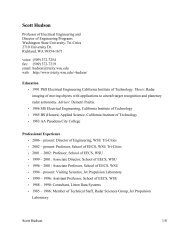SimRisk: An Integrated Open-Source Tool for Agent-Based ...
SimRisk: An Integrated Open-Source Tool for Agent-Based ...
SimRisk: An Integrated Open-Source Tool for Agent-Based ...
You also want an ePaper? Increase the reach of your titles
YUMPU automatically turns print PDFs into web optimized ePapers that Google loves.
2. Proof extraction and game-based result interpretation. Probabilistic model checking analyzes<br />
a system on a stochastic property by constructing a mathematical proof. Such proof carries<br />
rich in<strong>for</strong>mation about the system with respect to the stochastic property. For instance, in<br />
context of supply-chain analysis, a proof can be used to understand analysis result and to<br />
debug a supply-chain design. Furthermore, probabilistic model checkers like PRISM [Hinton<br />
et al., 2006] answers the maximal (or minimal) probability in which a stochastic property may<br />
hold on a supply chain. A proof can be used to <strong>for</strong>mulate an optimal solution that reaches<br />
such maximal (or minimal) probability.<br />
Current research on extracting proofs from probabilistic model checkers is still limited because<br />
of the complexity of these proofs. Existing work (cf. [Han et al., 2009]) emphasized on<br />
<strong>for</strong>mats of proofs. More research is needed on how to extract these proofs from existing<br />
model checking algorithms and interpreting them to end users. In this project, we will study<br />
the problems of proof extraction and result interpretation in context of supply chain analysis.<br />
We will extend Tan and Cleaveland [2002]’s previous works on extracting proofs from a<br />
traditional model checker to the domain of probabilistic model checking. Previously Tan<br />
[2002] also developed a generic game-theoretic framework <strong>for</strong> interpreting proofs from various<br />
automated verification procedures. The framework worked by playing an interactive game<br />
with a user. By making decisions during the game, the user could choose part of the proof<br />
(s)he wanted to explore. Game-theoretic approach is especially suitable <strong>for</strong> explaining proofs<br />
with branching logics, including proofs from <strong>for</strong>mal stochastic analysis of supply chains. Such<br />
proofs are (potentially infinite) decision trees extended with probabilities and rewards. In<br />
this project we will develop a game-theoretic approach that allows an end user to explore<br />
proofs constructed by a probabilistic model checker.<br />
5.4 Specific aim 4: implement an open source tool <strong>for</strong> knowledge dissemination<br />
and technology transfer<br />
The purpose of this research is to enable modeling and automated stochastic analysis technology<br />
that are efficient and scalable <strong>for</strong> real-world large-scale supply chains. Besides the project’s proposed<br />
technological advances, the success of the project also largely depends on how effective we can<br />
disseminate knowledge and transfer technology to other researchers and practitioners. <strong>An</strong> opensource<br />
tool will be an excellent vehicle <strong>for</strong> this purpose: it allow practitioners to try out new<br />
technology and integrate the new tool to his/her existing workflow. It also provides an open<br />
plat<strong>for</strong>m <strong>for</strong> researchers to test and extend new technology.<br />
Our team members have successfully developed a variety of open-source tools including Concurrent<br />
Workbench [Cleaveland et al., 2000], M 2 IST [Tan, 2006], and most recently Simrisk [Tan<br />
and Xu, 2009b]. We will apply these experience and skills to this project. Specifically we will build<br />
the tool on Eclipse [the Eclipse Foundation, since 2004]. Eclipse is a popular open-source software<br />
development plat<strong>for</strong>m. Its model-based design frameworks EMF and GMF reduce the time and<br />
the cost <strong>for</strong> implementing an agent-based modeling framework. Eclipse supports several code generation<br />
frameworks including JET and Acceleo that can be used <strong>for</strong> building the reconfigurable<br />
generative simulation engine. Finally Eclipse adopts an open architecture. Other researchers can<br />
integrate their own analysis algorithms to the tool.<br />
13




